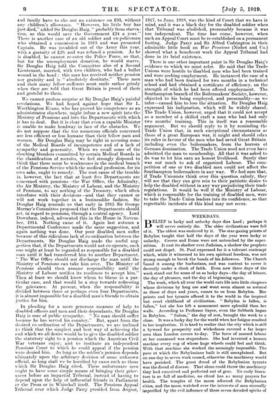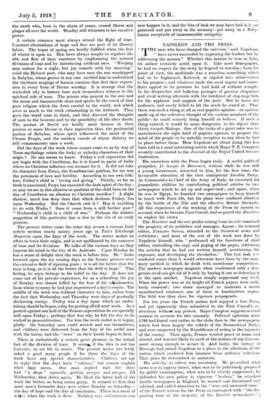WEEKDAYS.
BELIEF in lucky and unlucky days dies hard ; perhaps it will never entirely die. The older civilizations were full of it. The oldest was enslaved by it. The star-gazing priests of Babylon taught that half the days of the year were lucky or unlucky. Greece and Rome were not untouched by the superstition. It cast its shadow over Judaism, a shadow the prophets could not dispel. St. Paul expressed for it a tolerant contempt which, while it witnessed to his own spiritual freedom, was not strong enough to break the bonds of his followers. The Church found it among the barbarians, and was content to cover it decently under a cloak of faith. Even now three days of the week stand out for some of us as lucky days—the day of leisure, the day of pleasure, and the day of beginning again.
The week, which all over the world cuts life into little chapters whose divisions by long use and wont seem almost as natural as those of days and years, comes to us from Babylon. Her priests and her tyrants offered it to the world in the inspired but cruel childhood of civilization. "Babylon is fallen, is fallen," but she has left a monument more splendid than her walls. According to Professor Sayce, even the Sabbath began in Babylon. " Sulum," the day of rest, brought the week to a close. It was a lucky day for the world when her fatigue resulted in her inspiration. It is hard to realize that the city which is still a byword for prosperity and wickedness covered a far larger area than London covers to-day. The force of massed labour at her command was stupendous. She had invented a human machine every cog of whose huge wheels could feel and think. With that machine she worked the seemingly impossible. Tho pace at which the Babylonians built is still unexplained. But on one day in seven work ceased, otherwise the machinery would have perished. The great dread of the Babylonian tyrants was the dread of disease. That alone could throw the machinery they had conceived and perfected out of gear. No early literature is so full of medicine, no ritual has s3 many prayers for health. The temples of the moon adorned the Babylonian cities, and the moon watched over the interests of men eternally imperilled by the evil influence of those seven dreaded spirits of the earth who, born in the abyss of ocean, caused illness and plague all over the world. Monday still witnesses to her curative power.
A certain romance must always attend the flight of time. Constant alternations of hope and fear are part of its illusory fabric. The hopes of spring are hardly fulfilled when the fear of winter is upon us. Men have always sought to regulate the ebb and flow of their emotions by emphasizing the natural divisions of time and by introducing artificial ones. Weeping may endure for a night, but joy cometh with the morning," cried the Hebrew poet, who may have seen the sun worshipped in Babylon, whose genius at any rate enabled him to understand the rhythmic surgings of human emotion that find their expression in every form of Divine worship. It is strange that the wickedest city in history bore such tremendous witness to the spiritual side of man. The priests who prayed to the sun and the moon and innumerable stars and spirits lit the torch of that pure religion which the Jews carried to the world, and which owes so much to the week culminating in the Sabbath. They gave the world time to think, and they directed the thoughts of men to the heavens and to the possibility of life after death. The psalms of David are hardly more human in their passion or more Divine in their aspiration than the penitential psalms of Babylon, whose spirit influenced the mind of the Chosen People, and the earthen vessels of whose idolatry we still commemorate once a week.
Did the days of the week whose names come to us by way of Norse mythology retain the lucky or unlucky characters of their origin ? No one seems to know. Friday's evil reputation did not begin with the Crucifixion, for it is found in parts of India where no Christian influence can account for it. It did not take its character from Freya, the Scandinavian goddess, for she was the patroness of love and fertility. According to our own folklore, Friday's child is "loving and giving." Plainly, as far as birth is concerned, Freya has exorcised the dark spirit of the day ; or may we see in this allusion to qualities of the child born on the day of Crucifixion an allusion to Christian sacrifice ? A slight shadow, much less deep than that which darkens Friday, lies upon Wednesday. Did the Church cast it ? Has it anything to do with Wodin ? Does it come from a still further past ? "Wednesday's child is a child of woe." Perhaps the sinister suggestion of this particular line is due to the wit of an early punster.
The present writer came the other day across a curious little arbicle written nearly ninety years ago in Tait's Edinburgh Magaline upon the days of the week. The writer makes no effort to trace their origin, and is not spellbound by the romance of time and its divisions. He talks of the various days as they impress his mind in the city of St. Andrews. Upon Monday he has a sense of delight that the week is before him. He "looks forward upon the six coming days as the farmer glances over the extensive field of ripening grain ; it is all the better that the time is long, as it is all the better that the field is large." This feeling, he says, belongs in his belief to the day. It does not come out of his private experience, for as a schoolboy the joy' of Monday was almost killed by the fear of his schoolmaster, from whose tyranny he had just experienced a day's respite. The middle of the week was without character to him, unless from the fact that Wednesday and Thursday were days of gradually slackening energy. Friday was a day upon which no undertaking should be begun, a day for putting off till next week. As a protest against one half of the Roman superstition he ate specially well upon Friday ; perhaps that was why he felt the day to be 'soaked in procrastination. For him the week ended as it began, gladly. On Saturday men could stretch and sun themselves; and children were delivered from the fury of the awful man with the tawse, and the " raws" on their hands began to heal.
There is undoubtedly a certain great pleasure in the actual fact of the division of time. It seems', if the idea is not too fantastic, to set life to music. The present writer has lately asked a good many people if for them the days of the week have any special characteristics. Children are apt to reply that the days have "colours," but cannot explain what they mean. One man replied that the days had "a slope" upwards, getting steeper and steeper, till Wednesday, then down again. He liked the latter half of the week the better, as being easier going. It seemed to him that most men's favourite days were either Monday or Saturday— the day of hope and the day of conclusion. There is a sense of Kiev when the week is done. Nothing very unfortunate can now happen in it, and the bits of luck we may have had in it are garnered and put away in the memory—put away in a Babylonian receptacle of immeasurable antiquity.















































 Previous page
Previous page